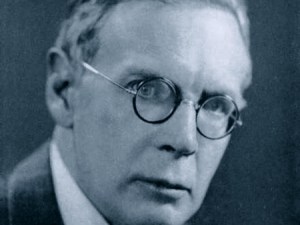
Inklings member and author Charles Williams surprisingly demonstrated that either affirmation or negation of life can be a legitimate path to personal fulfillment. (Image: public domain.)
As is now widely known, C. S. Lewis (The Chronicles of Narnia) was a member of a writer’s circle known as the Inklings. J. R. R. Tolkien also belonged to this remarkably talented group. A lesser-known member of the circle was the poet, novelist, and literary critic Charles Williams who, like Lewis, wrote a number of books about his deeply held religious beliefs.
The occult also fascinated Williams. He went on creatively to merge religion with the occult in a series of unusual novels that he referred to as “metaphysical thrillers.” (T. S. Eliot used the word “supernatural” when writing about them.) They read like speculative fiction yet manage to include elements such as the Holy Grail, tarot cards, King Solomon’s Stone, Platonic archetypes, doppelgangers, and a succubus all surrounded by insights into the eternal struggle between good and evil and the effects (both good and bad) of possessing great power. Williams is rare in assuming that great power can sanctify. When was the last time you saw a film or read a book where that was the case?
Williams was a thinking Christian yet his ideas have much broader utility than one might expect. One of his most important concepts deals with two of the basic ways of approaching life. Williams called these The Way of Affirmation and The Way of Negation. Instead of seeing the two ways as diametrically opposed, Williams demonstrated that they are in fact closely related. For Williams, affirmation means seeing and accepting (actually experiencing) the good things in life as signs or hints of greater joys to come in the afterlife. One enjoys the good things now while expecting even better things in the future. Negation means deliberately forgoing (renunciation) the good things in life in the belief that since they are only lesser signs and hints it is better to wait for the greater joy in the next life (heaven).
Hence, marriage and virginity, while superficially opposed, are, when taking a longer view, both evidence of a belief in the same thing. Both paths recognize, and demonstrate respect for, the value of sex. The hermit believes the happiness of life on earth – while pleasant – does not do the heavenly bliss and splendour justice. Rather than living in the world, he sets mainstream life aside and withdraws to await the unfolding of the greater glory in the hereafter. Both the hermit and the lover of life recognize, and show respect for, God’s creation.
Williams is arguing from the perspective of finding fulfillment in life. He is saying that whichever path we choose, the way of affirmation or the way of negation, our belief that we will be rewarded in some way for our choice means either path leads to fulfillment.
Those novels sound tempting, but I am sorry to say I haven’t yet even read CS Lewis’ books…
The Narnia films do a good job of capturing the essence of C.S. Lewis’ books for children. Mostly Christians now read Charles Williams’ novels. In fact, an American religious press issued all of my copies. I wrestle with loads of philosophical questions so people like Williams attract me. For the better adjusted, the English classics provide a richer hunting ground. I think you are already well established there, Lucinda.
I find it interesting that your bi-polar disorder led you to become more philosophical. Or was it the struggle that led you to philosophy. I can relate to the battle with bi-polar disorder. You seem to have a very inclusive and holistic approach to dealing with bi-polar, where writing is the sine qua non. There is a whole lot of new psychological research into why writing is therapeutic. Anyway, keep it up.
Thanks for taking the time to comment, Paul. I don’t think being bipolar in and of itself made me philosophical; it was indeed the struggle with the devastating effects of the disorder which set my feet on that path. Like most sufferers in my generation, I was not diagnosed until midlife, and until that time, had no idea what ailed me. A confused, deeply troubled life either sends one to the bottle or out on a quest for answers and understanding. Being reasonably intelligent and having little tolerance for alcohol, I became, at a young age, what may best be described as an analytical (in the logical sense) intellectual. At forty, I had the classic monstrous ego-inflation followed by a catastrophic nervous breakdown, withdrew from society, and began searching for answers in earnest. At this point, I also became an analytical intellectual in the psychiatric sense! Taking an “intellectual” interest in one’s psychotherapy is essential for success.
Following my breakdown, I resurrected, as part of the therapeutic process, old dreams of becoming a writer; and of course, journaling is encouraged as a beneficial adjunct to any psychotherapy. In the early going, I worked on two fronts: some rather inept attempts at fiction and some very successful efforts with journals, diaries and notebooks. After some years, I realized I had repeated Henry Miller’s experience of having developed my writing style in diaries and journals. I had also worked out a coherent integrated personal worldview. In essence, writing gave birth to and underpins my entire vision of life. Since bipolar disorder never goes away, I must always rely on writing to provide comfort and to maintain some reasonable degree of emotional and psychological stability.